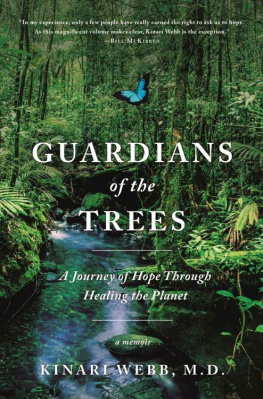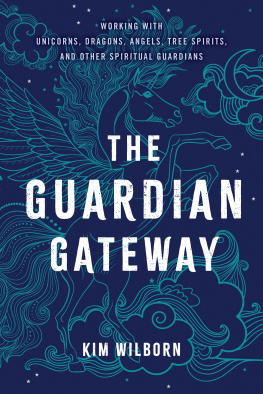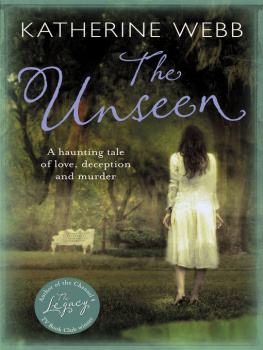Webb - Guardians of the Trees
Here you can read online Webb - Guardians of the Trees full text of the book (entire story) in english for free. Download pdf and epub, get meaning, cover and reviews about this ebook. year: 2021, publisher: Flatiron Books, genre: Non-fiction. Description of the work, (preface) as well as reviews are available. Best literature library LitArk.com created for fans of good reading and offers a wide selection of genres:
Romance novel
Science fiction
Adventure
Detective
Science
History
Home and family
Prose
Art
Politics
Computer
Non-fiction
Religion
Business
Children
Humor
Choose a favorite category and find really read worthwhile books. Enjoy immersion in the world of imagination, feel the emotions of the characters or learn something new for yourself, make an fascinating discovery.
- Book:Guardians of the Trees
- Author:
- Publisher:Flatiron Books
- Genre:
- Year:2021
- Rating:3 / 5
- Favourites:Add to favourites
- Your mark:
- 60
- 1
- 2
- 3
- 4
- 5
Guardians of the Trees: summary, description and annotation
We offer to read an annotation, description, summary or preface (depends on what the author of the book "Guardians of the Trees" wrote himself). If you haven't found the necessary information about the book — write in the comments, we will try to find it.
Guardians of the Trees — read online for free the complete book (whole text) full work
Below is the text of the book, divided by pages. System saving the place of the last page read, allows you to conveniently read the book "Guardians of the Trees" online for free, without having to search again every time where you left off. Put a bookmark, and you can go to the page where you finished reading at any time.
Font size:
Interval:
Bookmark:

Thank you for buying this
Flatiron Books ebook.
To receive special offers, bonus content,
and info on new releases and other great reads,
sign up for our newsletters.


Or visit us online at
us.macmillan.com/newslettersignup
For email updates on the author, click here.
The author and publisher have provided this e-book to you for your personal use only. You may not make this e-book publicly available in any way. Copyright infringement is against the law. If you believe the copy of this e-book you are reading infringes on the authors copyright, please notify the publisher at: us.macmillanusa.com/piracy.
to my child, who is such an unexpected blessing in my later years and is being born just as this book is
Throughout this book, with a few exceptions I use the traditional Indonesian method of addressing people: an honorific plus their first name. Most of the honorifics used are family terms, which are applied to the entire community as a traditional courtesy. For example, any man who has had children will be called Pak, which means father, and similarly, a woman will be called Ibu, meaning mother. A woman who does not have children is called Tante, which means Auntie, and this was how I was often referred to outside the clinic before I had a child. In the clinic and in official settings, I am called Dr. Kinari (or, affectionately, Dr. K). A young person is addressed using sibling terms that indicate their relative age: Mbak or Kak, older sister; Bang, older brother; and Adik, younger sibling. In Indonesia, in guessing someones age, you should guess on the older side, because it honors them moreeven though people may collapse in laughter if you get it wrong. Only if you are very, very close to someone can you use their name without any honorific at all. So I have not used an honorific for people I consider to be my close friend.
In quoting a conversation with an Indonesian, I have generally given only the English translation, even though (unless otherwise noted) those conversations were in Indonesian. (The translations are my own and are sometimes slightly loose so that the meaning is clear.) I have used peoples real names where appropriate, but I have changed the names of patients unless they gave me specific permission to share their stories. In some cases, I have changed the persons gender or other details to preserve their anonymity. In one case, I combined two meetings for clarity, but all other events are described as they occurred.
When you live in the forest, its easy to see that everythings connected.
DR. JANE GOODALL

Growing up in northern New Mexico, I shared a horse, Pinto, with one of our neighbors. One day, Pinto and I were cantering along the mesa top when he saw something. I dont know what it was, but he reared straight up and pivoted around. If you have ever heard the term runaway horseit is real. Pinto laid his ears back and full-out galloped straight for the edge of the mesa. I knew for certain that we would both die if we went over the edge. But Pinto was not responding to the reins, no matter what I tried. If I jumped off, neither of us would survive. Seconds from disaster, I remembered something I once readthat it is impossible for a horse to run with something hanging from its neck.
So I swung both feet over to the same stirrup, grabbed his mane with my right hand, and swung myself down under his neck at full gallop, gripping his mane on both sides. Pinto slid to a stop, just feet from the edge of the cliff, saving both our lives.
THAT DAY WITH PINTO TAUGHT ME an important lesson. Even when things look hopeless, it might still be possible to avoid disaster. This book is about my own work on what feels like the biggest cliff any of us could possibly face: the danger that our earth will no longer be livable for us. Global warming is happening faster than even the worst models predicted ten years ago. We are only beginning to understand just how dangerous the feedback loops can be, as reflective ice disappears, polar seas absorb sunlight and warm more quickly, and melting tundra releases methane into the atmosphere. The Intergovernmental Panel on Climate Change has said that if we dont halve carbon emissions by 2030, we may go beyond irreversible tipping points, at which time it wont matter what we do. In other words, that cliff is very close.
When most people think about emissions, they usually think only about burning fossil fuels for cars, airplanes, and electricity. They dont realize that deforestation releases as much carbon as the entire transportation sector for the whole world. Despite covering only 2 percent of the surface of the earth, rainforests support 50 percent of the worlds species and hold 25 percent of the worlds carbon, stored in both the trees and the soil. In addition, as trees grow, they continue to suck down carbon from the atmosphere.
Trees, and especially tropical rainforest trees, are our absolute best friends in halting the climate crisis, since they absorb a third of the pollution we emit every year. They are the natural climate solution, exquisitely invented through millions of years of evolution. Rainforests are huge banks of carbon, and the bigger the tree, the more carbon it absorbs as it growsand the more oxygen it releases. Forests are for this reason sometimes referred to as the lungs of the earth. When forest is logged or burned, most of that carbon gets released into the atmosphere, and the local cooling effects of the trees are lost as well. We do have to transition our world to one powered by alternative energies, but we also have to protect the tropical rainforests of the world, because even if we stopped releasing more carbon, we would need the forests help to get the earths atmosphere back into a safer balance.
No humans, in all of human existence, have lived through a time like this. Can we stop this runaway horse before we tumble off the cliff? Can we find a way to live sustainably and in balance with our planet? Is it possible for that transformation to be unexpected and profound?
For more than a decade, I have had the privilege to lead a tiny band of people resisting the loss of biodiversity and the poisoning of our earth, serving as a doctor who heals both people and nature. I founded two organizations that support this work, from different sides of the earth: Health In Harmony in the United States, and Alam Sehat Lestari in Indonesia. The Indonesian name translates to healthy nature everlasting, and the short form, ASRI (pronounced AHHS-ree), means harmoniously balanced. I have had the incredible joy of partnering with my Indonesian colleagues as they transcended poor education, lack of opportunity, and a culture of fatalism, to create a multi-award-winning model that honors the local communities as the wisdom holders for how to reverse rainforest loss and improve human well-being.
I hope this story will inspire and motivate you to join in this movement across the planet to bring about change. By listening to rainforest communities and partnering around the world, we can have huge impacts on the health of the whole planet. By working together, we can thrive.
SUKADANA, WEST KALIMANTAN, INDONESIA: JULY 2011
Next pageFont size:
Interval:
Bookmark:
Similar books «Guardians of the Trees»
Look at similar books to Guardians of the Trees. We have selected literature similar in name and meaning in the hope of providing readers with more options to find new, interesting, not yet read works.
Discussion, reviews of the book Guardians of the Trees and just readers' own opinions. Leave your comments, write what you think about the work, its meaning or the main characters. Specify what exactly you liked and what you didn't like, and why you think so.


















